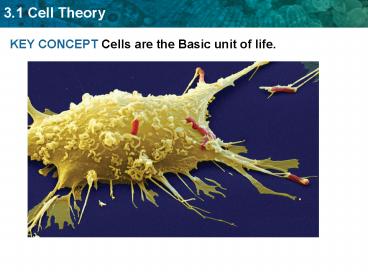KEY CONCEPT Cells are the Basic unit of life. PowerPoint PPT Presentation
1 / 17
Title: KEY CONCEPT Cells are the Basic unit of life.
1
- KEY CONCEPT Cells are the Basic unit of life.
2
- The cell theory grew out of the work of many
scientists and improvements in the microscope.
- Many scientists contributed to the cell theory.
3
- The cell theory grew out of the work of many
scientists and improvements in the microscope. - Many scientists contributed to the cell theory.
- More was learned about cells
as microscopes
improved.
4
- The cell theory grew out of the work of many
scientists and improvements in the microscope. - Many scientists contributed to the cell theory.
- More was learned about cells
as microscopes
improved. - The cell theory is a unifying
concept of biology.
5
- Early studies led to the development of the cell
theory.
- The Cell theory has three principles.
- All organisms are made of cells.
6
- Early studies led to the development of the cell
theory.
- The Cell theory has three principles.
- All organisms are made of cells.
- All existing cells are produced by other living
cells.
7
- Early studies led to the development of the cell
theory. - The Cell theory has three principles.
- All organisms are made of cells.
- All existing cells are produced by other living
cells. - The cell is the most basic unit of life.
8
- Prokaryotic cells lack a nucleus and most
internal structures of eukaryotic cells. - All cells share certain characteristics.
9
- Prokaryotic cells lack a nucleus and most
internal structures of eukaryotic cells. - All cells share certain characteristics.
- Cells tend to be microscopic.
10
- Prokaryotic cells lack a nucleus and most
internal structures of eukaryotic cells. - All cells share certain characteristics.
- Cells tend to be microscopic.
- All cells are enclosed
by a membrane.
11
- Prokaryotic and eukaryotic cells.
- All cells share certain characteristics.
- Cells tend to be microscopic.
- All cells are enclosed
by a membrane. - All cells are filled with
cytoplasm.
12
- There are two cell types eukaryotic cells and
prokaryotic cells.
13
- There are two cell types eukaryotic cells and
prokaryotic cells.
14
- There are two cell types eukaryotic cells and
prokaryotic cells.
15
- There are two cell types eukaryotic cells and
prokaryotic cells. - Prokaryote means
- first cells.
- Eukaryote means
- new cells.
16
- There are two cell types eukaryotic cells and
prokaryotic cells.
17
- Read the section in 3.1 detailing the two types
of cells prokaryotes and eukaryotes - Page 72 - Make a poster explaining their similarities and
differences. - Include
- Color
- Structures
- Examples
- Write a sentence explaining prokaryotes and
eukaryotes - Focus on the advances of the Eukaryotes (ie
new and improved!)

